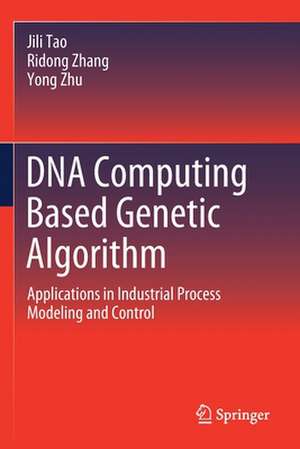DNA Computing Based Genetic Algorithm: Applications in Industrial Process Modeling and Control
Autor Jili Tao, Ridong Zhang, Yong Zhuen Limba Engleză Paperback – iul 2021
| Toate formatele și edițiile | Preț | Express |
|---|---|---|
| Paperback (1) | 924.91 lei 6-8 săpt. | |
| Springer Nature Singapore – iul 2021 | 924.91 lei 6-8 săpt. | |
| Hardback (1) | 930.78 lei 6-8 săpt. | |
| Springer Nature Singapore – iul 2020 | 930.78 lei 6-8 săpt. |
Preț: 924.91 lei
Preț vechi: 1127.94 lei
-18% Nou
Puncte Express: 1387
Preț estimativ în valută:
177.07€ • 184.05$ • 146.81£
177.07€ • 184.05$ • 146.81£
Carte tipărită la comandă
Livrare economică 06-20 februarie 25
Preluare comenzi: 021 569.72.76
Specificații
ISBN-13: 9789811554056
ISBN-10: 9811554056
Ilustrații: IX, 274 p. 187 illus., 108 illus. in color.
Dimensiuni: 155 x 235 mm
Greutate: 0.4 kg
Ediția:1st ed. 2020
Editura: Springer Nature Singapore
Colecția Springer
Locul publicării:Singapore, Singapore
ISBN-10: 9811554056
Ilustrații: IX, 274 p. 187 illus., 108 illus. in color.
Dimensiuni: 155 x 235 mm
Greutate: 0.4 kg
Ediția:1st ed. 2020
Editura: Springer Nature Singapore
Colecția Springer
Locul publicării:Singapore, Singapore
Cuprins
Introduction.- DNA computing based RNA-GA.- DNA double-helix based hybrid genetic algorithm.- DNA computing based multi-objective genetic algorithm.- Parameter identification and optimization for chemical process.- RBF neural network for nonlinear SISO system.- T-S Fuzzy neural network for nonlinear SISO system.- PCA & GA based ARX plus RBF Modeling for Nonlinear DPS.- GA based predictive control design.- MOGA based PID controller design.- Concluding Remarks.
Notă biografică
Jili Tao received her B.Sc. and Ph.D. from Central South University and Zhejiang University, China, in 2004 and 2007, respectively. She is currently a Professor at the Institute of Ningbo Technology, Ningbo, China. Her research interests include intelligent optimization, modeling and its applications to electronic system design and control system design.
Ridong Zhang received his Ph.D. in Control Science and Engineering from Zhejiang University, Hangzhou, China, in 2007. From 2007 to 2015, he was a Full Professor with the Institute of Information and Control, Hangzhou Dianzi University, Hangzhou. Since 2015, he has been a Visiting Professor at the Chemical and Biomolecular Engineering Department, Hong Kong University of Science and Technology. His research interests include process modeling, model predictive control and nonlinear systems.
Yong Zhu, received M.Sc. degrees from HangZhou DianZi University, China, in 2004. He is currently a lecturer in the Institute of Ningbo technology, Ningbo, China. Meanwhile he has been a Ph.D. candidate in Ningbo University. His present research interests in electronic system design and advanced control system design.
Ridong Zhang received his Ph.D. in Control Science and Engineering from Zhejiang University, Hangzhou, China, in 2007. From 2007 to 2015, he was a Full Professor with the Institute of Information and Control, Hangzhou Dianzi University, Hangzhou. Since 2015, he has been a Visiting Professor at the Chemical and Biomolecular Engineering Department, Hong Kong University of Science and Technology. His research interests include process modeling, model predictive control and nonlinear systems.
Yong Zhu, received M.Sc. degrees from HangZhou DianZi University, China, in 2004. He is currently a lecturer in the Institute of Ningbo technology, Ningbo, China. Meanwhile he has been a Ph.D. candidate in Ningbo University. His present research interests in electronic system design and advanced control system design.
Textul de pe ultima copertă
This book focuses on the implementation, evaluation and application of DNA/RNA-based genetic algorithms in connection with neural network modeling, fuzzy control, the Q-learning algorithm and CNN deep learning classifier. It presents several DNA/RNA-based genetic algorithms and their modifications, which are tested using benchmarks, as well as detailed information on the implementation steps and program code. In addition to single-objective optimization, here genetic algorithms are also used to solve multi-objective optimization for neural network modeling, fuzzy control, model predictive control and PID control. In closing, new topics such as Q-learning and CNN are introduced. The book offers a valuable reference guide for researchers and designers in system modeling and control, and for senior undergraduate and graduate students at colleges and universities.
Caracteristici
Provides step-by-step tutorials and program codes Presents GA applications for single-objective and multi-objective optimization in connection with nonlinear system modeling and distributed parameter system modeling Proposes control optimization methods from traditional PID controllers and advanced model predictive controls to advanced fuzzy controllers Introduces the newest topics in deep learning and CNN
